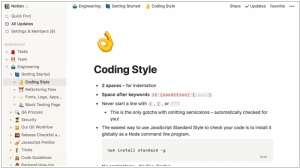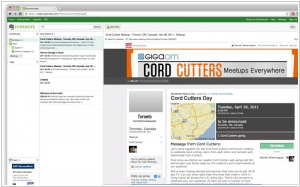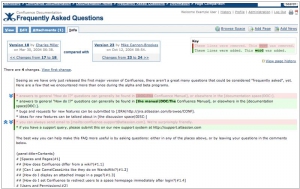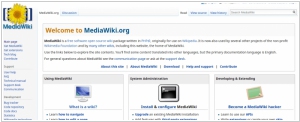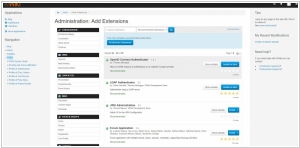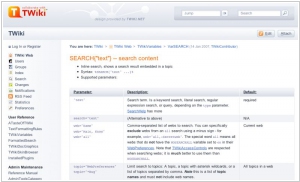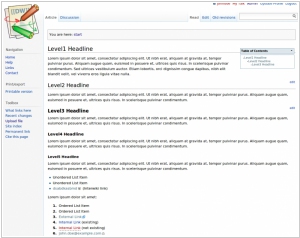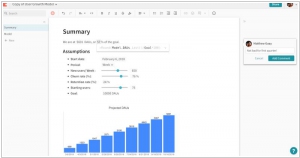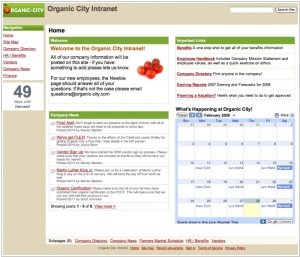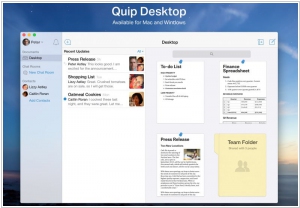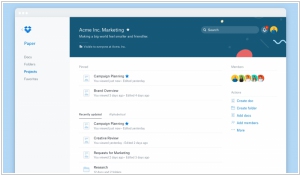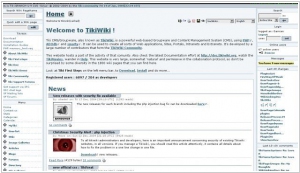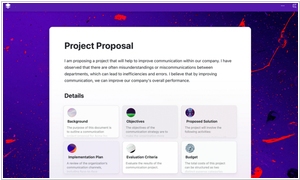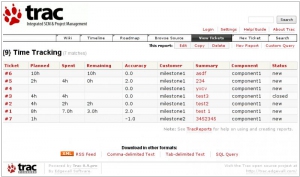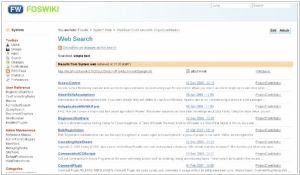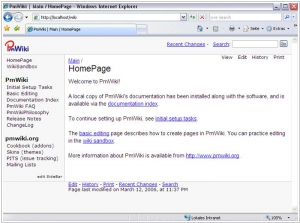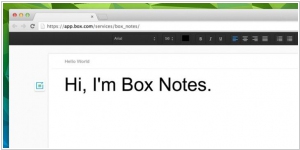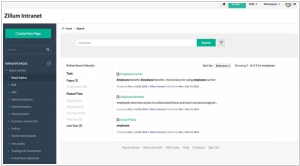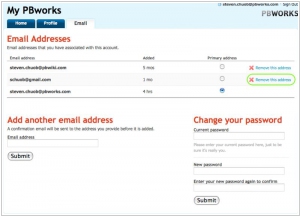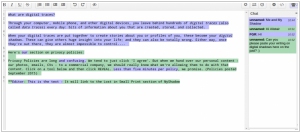Top 10 Wiki and Collaborative document editors
February 10, 2024 | Editor: Adam Levine
14
Wiki and collaborative document editors are online platforms that allow multiple users to collaborate and contribute to a document or knowledge base in a structured and organized manner. These tools enable real-time editing, version control, and commenting, fostering collaborative teamwork, knowledge sharing, and documentation of information that can be accessed and updated by team members from anywhere, promoting transparency and efficiency in collaborative projects.
1
Notion – The all-in-one workspace for your notes, tasks, wikis, and databases. A new tool that blends your everyday work apps into one. It's the all-in-one workspace for you and your team
2
Evernote is a suite of software and services designed for notetaking and archiving. Evernote supports a number of operating system platforms (including Microsoft Windows, Mac OS X, Android, iOS and WebOS), and also offers online synchronization and backup services.
3
Confluence provides one place for technical teams to collaborate—create, share, and discuss your ideas, files, minutes, specs, mockups, diagrams, and projects. A rich editor, deep Office and JIRA integration, and powerful plugins help teams collaboratively develop technical docs, intranets, and knowledge bases.
4
MediaWiki is a popular free web-based wiki software application. Developed by the Wikimedia Foundation, it is used to run all of its projects, including Wikipedia, Wiktionary and Wikinews. It is written in the PHP programming language and uses a backend database.
5
The XWiki project offers both a generic platform for developing collaborative applications using the wiki paradigm and products developed on top of it. All XWiki software is developed in Java and under the LGPL open source license.
6
TWiki is a flexible, powerful, and easy to use enterprise wiki, enterprise collaboration platform, and web application platform. It is a Structured Wiki, typically used to run a project development space, a document management system, a knowledge base, or any other groupware tool, on an intranet, extranet or the Internet.
7
DokuWiki is a simple to use and highly versatile Open Source wiki software that doesn't require a database. It is loved by users for its clean and readable syntax. The ease of maintenance, backup and integration makes it an administrator's favorite.
8
No more ping-ponging between documents, spreadsheets, and niche workflow apps to get things done. Coda brings all of your words and data into one flexible surface.
9
Google Sites is a structured wiki- and web page- creation tool offered by Google as part of the Google's Productivity suite. Unlike most alternatives Google Sites is free.
10
Quip changes the way teams work together. Real work gets done, faster, smarter. Owned by Salesforce and integrated with Salesforce
11
Dropbox Paper is a new type of document designed for creative work. Collaborate in real time, assign tasks, make to-do list and more.
12
Tiki is the Free/Libre/Open Source Web Application with the most built-in features. So whatever feature you can imagine running in your browser window, chances are Tiki does it. Knowledge base: Wiki, FAQs, File gallery, Photo Album, Tags, Search, Kaltura video management integration, etc. Collaboration/Project Management: Wiki, Forums, Tasks, Permissions, Timeline, Proposals/Votes, Blog, Categories, Watch, etc.
Publishing/web site: News articles, Blog, RSS, Newsletter, Maps, Themes, Banners, WYSIWYG, SEO, etc.
13
Craft brings structure to your documents – and gives you the tools and freedom to do it your way. Seamlessly combine images, text, media or tables for the perfect experience.
14
Trac is an alternative wiki and issue tracking system for software development projects. Trac uses a minimalistic approach to web-based software project management. Our mission is to help developers write great software while staying out of the way. Trac should impose as little as possible on a team's established development process and policies.
15
Foswiki is an open, programmable collaboration platform. Runs on Linux, Mac OS X, Windows (even stand alone on a USB Stick), also available as easy-to-setup software appliance for VMware or VirtualBox
16
PmWiki is a wiki-based system for collaborative creation and maintenance of websites. PmWiki pages look and act like normal web pages, except they have an "Edit" link that makes it easy to modify existing pages and add new pages into the website, using basic editing rules. You do not need to know or use any HTML or CSS. Page editing can be left open to the public or restricted to small groups of authors.
17
Box Notes is a lightweight editing tool. Create documents, take notes and share ideas in real-time with anyone. Ideas get stronger with teamwork. Box Notes is designed to make that happen. Your business ideas should live with the rest of your business content. Now they can.
18
Zoho Wiki, an easy to use knowledge management tool, caters to the particular needs of teams within your organization. Now you can effectively create and share knowledge.
19
PBworks lets your team capture knowledge, share files, and manage projects. It tracks every change, and automatically notifies you and your team to keep everyone in the loop. PBworks is secure, reliable, and accessible from any computer or mobile device, so your team can use it anywhere they go. You can even use it with clients or partners. And because it's hosted, you don't need to download any software or manage any servers. Whatever you're working on, you can customize PBworks to make your team more productive.
20
Etherpad is a highly customizable Open Source online editor providing collaborative editing in really real-time. Etherpad allows you to edit documents collaboratively in real-time, much like a live multi-player editor that runs in your browser.
Latest news about Wiki and Collaborative document editors
2024. Notion acquires privacy-focused productivity platform Skiff
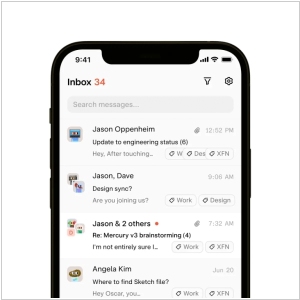
Notion has acquired Skiff, a platform established in 2020 by Andrew Milich and Jason Ginsberg, which specializes in providing end-to-end encrypted file storage, document management, calendar functionalities, and email services. Skiff initially garnered $14.2 million in funding and positioned itself as a secure alternative to Google Docs, expanding its offerings to include productivity solutions like calendars and emails. Skiff announced its integration with Notion on its website, along with the decision to discontinue its services after a transition period of six months. The company assured users that their Skiff accounts would not be automatically converted into Notion accounts but emphasized the ease of exporting or migrating data to other platforms.
2021. Notion acquires India’s Automate.io in push to accelerate product expansion
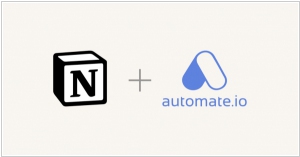
Workplace productivity startup Notion has recently acquired Automate.io, an Indian startup renowned for developing connectivity and integrations with more than 200 services. This acquisition serves as a strategic move for Notion to expedite its product expansion and enhance its appeal to the growing number of individuals and businesses transitioning to digital collaborative tools. With the addition of Automate.io, Notion gains valuable insights into the 200 integrations the Indian startup has built. This knowledge will enable Notion to empower users and enterprises by incorporating their workflows seamlessly into the Notion platform.
2021. Collaborative iOS app Craft Docs secures $8M
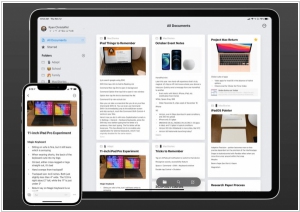
The Craft Docs app, originally designed as a collaborative document platform exclusively for iOS, has successfully raised $8 million in a Series A funding round. While currently available on iOS, iPadOS, and MacOS, Craft has ambitious plans for 2021, including the launch of APIs, extended integrations, and a browser-based editor. The company aspires to position itself as a comparable product to Notion. Balint Grosz, the CEO of Craft, explains that while Notion primarily focuses on writing, wikis, and similar functionalities, Craft provides a superior solution, particularly for written content. While Notion excels in databases and structural content, Craft is perceived as a strong competitor due to the similarities in the product. Although the markets may not significantly overlap, there is a notable trend of users switching from Notion to Craft and viewing them as direct competitors.
2021. Atlassian peps up Confluence with new graphical design features
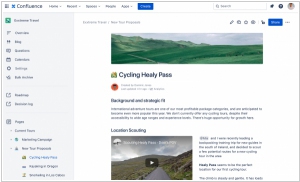
Confluence, the collaborative workspace developed by Atlassian, has been a staple knowledge-sharing tool for over 15 years, widely adopted by companies for its versatility. In its latest update, Confluence introduces several new features to enhance user experience. Users can now customize their spaces with cover images, title emojis, and personalized avatars that represent different sections of Confluence. The addition of smart links allows for seamless integration with platforms like YouTube and Trello, automatically recognizing and displaying links in their native formats. Furthermore, users can schedule the publication of new pages and convert pages into blog posts, reflecting the increasing popularity of corporate blogging within organizations, particularly for internal audiences during the pandemic.
2020. Online workspace startup Notion raises $50M
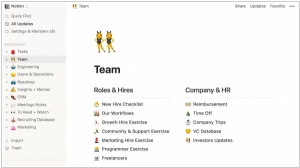
Online workspace startup Notion has secured $50 million in fresh funding, valuing the company at $2 billion. Established in 2016, Notion offers a comprehensive workspace solution encompassing note-taking, task management, wikis, and databases. Its unique proposition lies in consolidating various work applications into a single platform, making it ideal for efficient task and project management. Notably, amidst the global COVID-19 pandemic, Notion's remote work support played a significant role in attracting investors. The company experienced a surge in new customer sign-ups, setting new records, as remote working became the norm due to the pandemic. The exponential growth of remote work in 2020, spurred by COVID-19, has significantly bolstered the user base of remote work tool providers across different industries.
2020. Atlassian’s Confluence gets a new template gallery
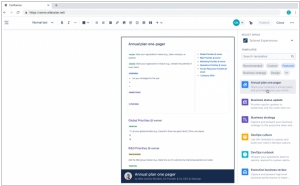
Confluence, the content-centric collaboration tool by Atlassian, is simplifying the onboarding process for new users through the introduction of an enhanced template gallery, featuring 75 additional templates. This update signifies the evolution of Confluence from a specialized wiki primarily used by technical documentation teams to a widely adopted tool utilized across various organizations. The revamped template gallery offers improved search tools, filters, and previews conveniently located in the right-hand panel of your Confluence site. These enhancements facilitate the seamless discovery of templates that are most relevant to your business needs.
2016. Social knowledge base MindTouch gets $12 Million
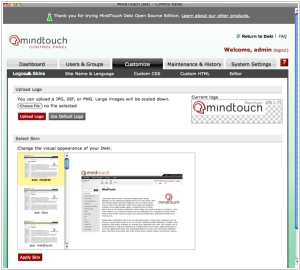
MindTouch, a cloud service that assists customers in locating answers to product-related queries by utilizing existing documentation, training materials, and customer service documents, has announced $12 million in funding following several years of bootstrapping. Their approach involves taking a company's existing content and making it accessible online for customers to utilize. This is achieved by breaking down the content into smaller sections and extracting metadata to enable online searchability. Furthermore, MindTouch employs machine learning techniques to organize logical learning paths through the materials. As a result, customers can easily search for and locate the information they require without the need to contact customer service.
2014. Workplace messaging app Cotap now lets you text documents from Box, Dropbox and others
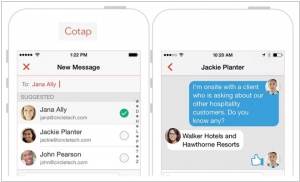
Cotap, the startup aiming to become the workplace equivalent of "WhatsApp," is expanding its services beyond mobile messaging. The company is now venturing into file sharing by integrating with popular platforms such as Box, Dropbox, Google Drive, and Microsoft OneDrive. Additionally, Cotap is introducing web and desktop applications, initially designed for Mac users, to provide accessibility even when users are not using smartphones or tablets. The company is also releasing updated mobile apps for both iOS and Android. Founded by former Yammer executives, Cotap has rapidly gained traction, surpassing 10,000 business customers. These customers typically consist of small to medium-sized businesses with employee counts ranging from 50 to 100. Prominent clients include Philz Coffee and the Hyatt chain of hotels.
2014. Google Wave is back. Via Sandstorm
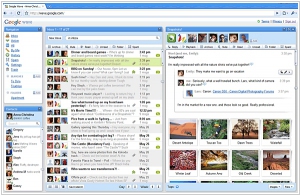
4 years ago, Google discontinued its advanced collaborative messaging service called Google Wave and transferred its code to the Apache project. The project quietly continued its development, but in a manner that required users to operate their own server. However, Wave has now made a comeback in an easily accessible Software-as-a-Service (SaaS) format for those interested. The intriguing Sandstorm project, which focuses on constructing a "personal cloud platform" that can be either hosted for regular users or self-installed by tech-savvy individuals, has successfully adapted Wave to their platform. This means that Sandstorm users can effortlessly install Wave with a simple click and commence collaboration with friends and colleagues, eliminating the need for server setup.
2014. Box Notes is available on Android
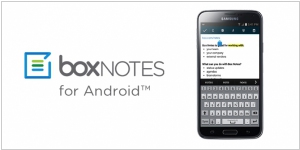
Box has released an update for its Android app, introducing the inclusion of the lightweight document editor, Box Notes. With the latest version of Box for Android, users can now create, view, and edit Box Notes directly within the app, similar to the web version. Box Notes on Android seamlessly integrates with the native menus, providing access to essential editing features such as cut, copy, paste, bold, italic, underline, bullet lists, numbered lists, indenting, and outdenting. Additionally, users can now create checklists using Box Notes across web and mobile platforms, with the interface available in multiple supported languages. The Android update also introduces several other productivity-enhancing features, including a recently opened files section, advanced settings for shared URLs, and more extensive administrative controls.
2011. Google wants to mobilize business sites
For those businesses that still don't realize that the great majority of their customers coming (or would like to come) to their site via smartphones, Google launched the new initiative GoMo. This service allows you to see how your site looking in the mobile browser and find an appropriate service for building mobile site version (Google Sites is also in the list). Who should think about the mobile site version? First of all, it's online stores. Because browsing stores on a smartphone - is the most popular activity among those sitting in a toilet. Second, that are local businesses: cafes, restaurants, hotels, shops, medical services, hair salons, car repair ... - all the things that city visitor or local inhabitant may need. ***
2011. JIRA, Confluence available as SaaS services
Atlassian has launched the new SaaS service Atlassian OnDemand, which includes its popular tools for managing software development projects: JIRA (issue-tracker), Confluence (wiki), GreenHopper (Agile Project Management), Bonfire (bug reporter), FishEye (code manager), Crucible (code review) and Bamboo (integration). All products in the SaaS version provide the full functionality of the installable counterparts. There are only minimal restrictions on the tool integration and use of the custom plug-ins. You can turn on/off the tools as needed. The service pricing is traditional for Atlassian - "everything for $10 for 10 users." Recall that the company is also selling the 10-user leniences of the same installable products for $10. So you can either buy the product for $10, or rent it for $10/month. ***
2010. Cisco Quad - enterprise social software + video
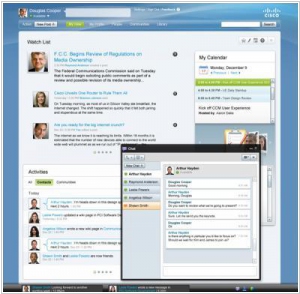
Late last year, Cisco introduced the social intranet system with a long name Cisco Enterprise Collaboration Platform and this solution hit the Top 10 Enterprise 2.0 products in 2009 by ReadWriteWeb. Now Cisco starts selling the system under the new name - Cisco Quad. The functionality of the system at first glance seems to be traditional for enterprise social software: user profiles, personal start pages, microblogs and communities (for group collaboration). But of course, Cisco added to the system its main feature - video. From anywhere in the system, where user's avatar appears, you can see his online status, send him an instant message or start a video conference. And, of course, Cisco Quad is closely integrated with Cisco Webex web conferencing service and Cisco Unified Communications . ***
2010. Zoho Wiki comes to Enterprise
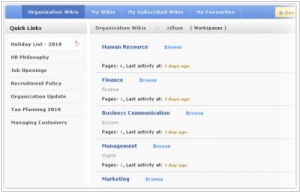
Although Zoho is positioned as a SaaS vendor for small business, it doesn't forget about the enterprise customers. The new features in Zoho Wiki 2.0 primarily target large companies. First of all, that are workspaces, which are useful for creating separate wikis for company departments. Each workspace has its own administration panel, security settings and appearance (customizable at CSS level). The access control system (which is also actual for large companies) was dramatically improved. Now you can set the detailed access rights at page, workspace or wiki level for employees, user groups, domains or customers. ***
2009. MindTouch - Anti Social Software

(Aaron Fulkerson, MindTouch CEO) ***
2009. PBWorks - business wiki in real-time
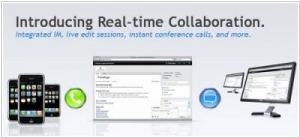
Today we more and more often hear the new term - "unified collaboration". This is the new logical step after "unified communications" and means that collaboration and communication tools are integrated. The pioneer in this movement is PBWorks (formerly PBWiki) - an enterprise wiki service. Today they announced four new features for communications and collaboration in real-time: messenger, live notifications, real-time, editing, voice conferencing. Interesting, that after that PBWorks positions itself, as the Google Wave alternative. But, while Google Wave is an attempt to re-think the concept of individual communication, PBWorks is built around corporate networks and project workspaces, and ***
2009. Windows 7 - cloud-native OS

Yesterday Windows 7 was officially released. Of course, it's a very important event for IT users and professionals, but we, first of all, wondered about how this new OS could influence the Cloud Computing sphere. And though, at first sight, it has nothing in common with the Cloud, there are some technical aspects that make Windows 7 (in combination with its server counterpart Windows Server 2008 R2) the first cloud-native OS from Microsoft. The fact is that the Windows-based IT infrastructure highly depend on two key components: Active Directory (for network administration) and Network Access Protection (for network security). Until Windows 7 both these technologies didn't work if server was located in the Cloud (on remote server) but not in Local Area Network. ***
2009. Social Software leaders: Jive, SocialText and NewsGator

Social Software adopts consumer web achievements (wikis, blogs, profiles, tags, ratings, social connections, people search, micro-blogging) in the enterprise environment. Of course, today almost all software vendors say that their software provides social computing, but in most cases it's only PR pitches and their software is not really social. At the same time there are few "native social software" solutions, that provide a social layer for company intranet and really enable it to achieve the social software objectives: create enterprise-wide community and improve collaboration. The most successful on this market are 3 solutions: Jive SBS, SocialText and NewsGator Social Sites. ***
2009. Google Sites takes on Sharepoint (Seriously)
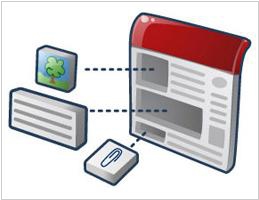
As was promised by Data Liberation Front, Google opens access to the data stored inside its intranet-service Google Sites. It's implemented in a form of Google Sites API. So, from now, users shouldn't worry that they can't backup or import their data in a suitable format. But "data liberation" is not the main reason why Google Sites API was created. It's rather a necessary move to survive. Because Google is developing all these business tools not to make money, but to compete with Microsoft and to draw its attention from the search/advertising market. And if Google Sites doesn't rival its antipode - Sharepoint, it has a chance to be dismissed. ***
2009. MindTouch will provide collaborative video feature
MindTouch, the open-source enterprise wiki solution, has joined forces with Kaltura to introduce comprehensive collaborative video capabilities to the enterprise. This partnership allows MindTouch customers to collaboratively edit, publish, and distribute videos both internally and externally, while maintaining a detailed revision history. While many top-tier wikis and intranets already support easy video embedding, none of them provide significant video editing capabilities, especially in a transparent and collaborative manner. Kaltura stands out as the pioneer in delivering an open-source collaborative video solution, and MindTouch will become the first enterprise platform to integrate and host Kaltura's innovative technology.
2009. Socialtext announced Enterprise Microblogging Server Appliance
Socialtext is introducing a new paid service designed for larger enterprises, offering them the ability to utilize a Twitter-like service within their own internal network infrastructure. This service can be accessed behind the company's firewall. The cost for this service is $1 per user, per month, in addition to a monthly fee for Socialtext's server appliance. The appliance fee covers regular software updates, addressing bug fixes and introducing new features. By connecting the appliance to local staff directories, employee information can be seamlessly integrated to create user accounts with pre-filled profile details, including phone numbers and email addresses. Any changes made in the local directory will automatically update the corresponding information in Socialtext. Notably, administrative control is not limited solely to IT staff, as certain users can be granted their own administrative privileges, allowing them to moderate both user-generated content and user accounts.
2009. MindTouch created Collaborative Intranet
MindTouch has recently unveiled the inaugural offering in a series of three cooperative network solutions leveraging their open-source collaboration platform: MindTouch Collaborative Intranet. MindTouch asserts that the Collaborative Intranet facilitates seamless aggregation of information from diverse enterprise applications and data repositories essential for employee productivity. By incorporating data from file servers, ERP systems, CRM systems, email, social networks, and web services, a unified, interactive, and scalable interface is established.
2009. Socialtext offeres free version for small business
Socialtext is entering the freemium market with its latest offering, SocialText Free 50, which allows companies to access many of Socialtext's services for free, with a limit of up to 50 users. This includes social networking, wiki, site building, and messaging tools. The only limitations are having only one wiki workspace (paid accounts offer unlimited workspaces) and basic online support without additional assistance. For the paid service, pricing starts at $6 per user per month for a hosted plan. Larger companies have the option to pay $1,000 per month, with an additional $1 or $5 per user, depending on whether they prefer hosted or on-site capabilities. Concurrent with the launch of Socialtext Free 50, the company is also introducing the beta version of its SocialCalc spreadsheet service. SocialCalc is designed to facilitate easy group editing and eliminate conflicts when multiple individuals collaborate on a document. Importantly, SocialCalc seamlessly integrates with all other Socialtext offerings.
2009. PBworks incorporates project management
PBworks has introduced PBworks Project Edition, a modified version of its collaborative online wiki software that integrates project management features. The tool incorporates simple project management functionalities, including workflow management, task assignment, and milestones, eliminating the need for a separate application like Basecamp. This integration makes PBworks an appealing choice for teams seeking a collaborative tool for project-related tasks such as document creation, requirements gathering, or design review. Task management is seamlessly integrated with the tasks themselves, providing a logical and efficient approach. PBworks Project Edition is priced at $20 per user per month, while "guest" licenses, intended for clients and contractors involved in a specific project, are available free of charge.
2009. Atlassian announced Confluence 3.0 and Plugin Exchange
Atlassian has announced the release of Confluence 3.0, an upgraded version of their enterprise wiki platform, with a strong focus on enhancing the social networking aspects. The new release introduces activity streams and Twitter-like status updates, marking a significant advancement for Atlassian. Users can now post status updates of up to 140 characters and choose to follow their colleagues' updates selectively or subscribe to entire activity streams through the web interface or RSS. While personal profiles and status updates are not groundbreaking in the realm of social software, these features enhance collaboration and communication within Confluence. Additionally, Atlassian has introduced the Plugin Exchange, a marketplace where users can download, rate, and review numerous third-party plugins. With this centralized site, Atlassian aims to create a more community-driven marketplace for Confluence plugin developers. As part of this initiative, Atlassian has acquired GreenHopper, an agile project management plugin for their JIRA issue tracking software, further complementing the launch of the Plugin Exchange.
2009. MindTouch announced Desktop Suite
MindTouch, the collaborative wiki platform for enterprises, has unveiled its Desktop Suite, a comprehensive set of tools designed to transform Windows documents and files into web-based, searchable, editable, and shareable resources. With one-click publishing from any application, improved drag and drop capabilities, and rapid content indexing, the suite offers enhanced functionality and convenience. It consists of three key components: Aurelia Reporter enables the publishing and sharing of versioned documents, Desktop Connector allows seamless file and directory transfer into the MindTouch environment, and Microsoft Word and Outlook Connectors enable effortless publishing of documents, threaded conversations, and attachments. These tools empower users to collaborate effectively through web browsers, eliminating the need for additional software installations.
2009. PBwiki targets business users with a new name
PBwiki has rebranded itself as PBworks to better align with its expanded offerings and functionalities beyond a traditional wiki platform. With a revamped user interface and enhanced features introduced last year, PBworks now provides businesses with a customizable wiki workspace that includes mobile support, document management, access controls, and more. In addition, the company plans to launch a new project management application in the coming months. PBworks has also introduced a specialized "Legal Edition" that combines wiki functionality with case management features, offering a legal knowledge base and an electronic deal room for efficient file management by legal professionals. With a strong client base that includes teams from over a third of the Fortune 500, as well as prestigious institutions like the United Nations, The Financial Times, and Harvard University, PBworks has gained a loyal following. Similar to Salesforce, PBworks operates on a paid subscription model, ensuring an ad-free experience for its users.
2009. SamePage Wiki joins Force.com
eTouch Systems has announced the integration of its enterprise wiki solution, SamePage, with Salesforce.com's Force.com AppExchange. With this integration, organizations can now deploy SamePage within the Force.com platform, allowing employees to collaborate and share ideas in a centralized location. SamePage has already gained popularity among notable companies such as Alcatel-Lucent, NASA, Citrix, Hestia, Teradyne, Siemens, NY State Unified Court System, and ADP, who utilize the wiki for project collaboration, problem-solving, and sharing knowledge among colleagues. Additionally, SamePage offers the functionality to publish content to a customizable blog. Leveraging the Force.com platform, SamePage is readily available for deployment through the Force.com AppExchange, with pricing starting at $100 per month for up to 20 users, $200 for 21 to 50 users, and $400 for up to 100 users.
2009. MindTouch upgrades its Wiki Platform
MindTouch has unveiled an updated version of its enterprise-focused, open-source wiki-collaboration platform. This platform serves as a connection hub, enabling teams to integrate enterprise systems, web services, and Web 2.0 applications while maintaining IT governance. The latest release introduces enhanced capabilities for developers to create advanced and feature-rich internet applications by combining MindTouch's DekiScript (a scripting language) and Javascript using the JEM (Javascript with events and messages) technology. This advancement empowers developers to build more intricate and innovative applications. The software holds great potential for businesses seeking seamless collaboration between content and IT teams across a web-based platform. It's worth noting that MindTouch offers a free open-source software core and provides premium services starting at $2,000.
2009. Socialtext Adds Enterprise Twitter
Socialtext is enhancing its enterprise wiki with a Twitter-like messaging service called Socialtext Signals. This new feature can be accessed as a widget in the Socialtext dashboard or as a standalone Adobe AIR application. Similar to Yammer, Socialtext Signals allows employees within a company to engage in micro-messaging, with each user only seeing the messages of their selected co-workers. Apart from the 140-character messaging capability, known as "signals," there is also an "activity" tab that generates micro-messages whenever someone you follow takes action within Socialtext, such as creating a wiki page or writing a blog post. Socialtext Signals aims to keep employees involved and informed, notifying them of any changes made to pages they have previously edited or created. While Signals lacks the ability to create subgroups or upload files like Yammer, users can still create workgroups in other areas of Socialtext and directly upload files to linked wikis. While Signals offers comprehensive integration, it currently lacks mobile support, which represents a notable gap in its functionality.

